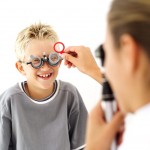 Vision is closely related to a child’s overall mental and physical development. While some vision problems are obvious, some are very subtle. A child may pass the vision screening at school or at the pediatrician’s office with flying colors and yet still have a very significant visual problem. Sustained visual tasks, such as reading or looking at an iphone, or tasks that require frequent eye focusing changes, like copying from a chalkboard or playing sports, stress the eyes in a different way than reading letters on a chart.
Vision is closely related to a child’s overall mental and physical development. While some vision problems are obvious, some are very subtle. A child may pass the vision screening at school or at the pediatrician’s office with flying colors and yet still have a very significant visual problem. Sustained visual tasks, such as reading or looking at an iphone, or tasks that require frequent eye focusing changes, like copying from a chalkboard or playing sports, stress the eyes in a different way than reading letters on a chart.
A thorough eye and vision exam will determine how clearly a child sees AND how well the child is able to use her eyes together. Each eye must receive a crisp, clear image on the retina for both distance and near viewing, and the eyes must work as a comfortable, binocular system. An eye care professional will perform the following:
• visual acuity for each eye, potential need for glasses
• eye health, checking for eye allergies, growths inside the eye, etc.
• coordination of the two eyes together, depth perception, etc.
• focusing (or accommodation) of the eyes for sustained near vision tasks
• the need for referral to a specialist for vision therapy or eye health conditions
• discussion of how eyes are affected by nutritional and environmental factors
The American Optometry Association recommends an eye exam for children at age 3 and age 5 to assess baseline visual function and eye health, and to determine the risk of any visual or health disorders for that child’s future. Please schedule an eye exam sooner if you notice any symptoms, such as closing one eye frequently, one eye turns in or out frequently, one eye appears different especially in photos, or redness, tearing, discharge from the eyes.
 Subscribe
Subscribe